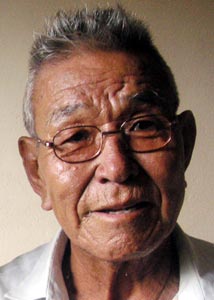Name: Tashi Nyima
(Alias: No)
Gender: Male
Interview Age: 76
Date of Birth: 1931
Birthplace: Tsakhalowa, Kham, Tibet
Year Left Tibet: 1957
Profession: Farming, Transportation
Monk/Nun: No
Political Prisoner: No

Interview No.: 7
Date: 2007-07-01
Language: Tibetan
Location: Lugsung Samdupling Settlement, Bylakuppe, Karnataka, India
Categories: Chinese Invasion and Occupation
Keywords: brutality/torture, business practices/livelihood, childhood memories, Chinese -- oppression under, Chinese Nationalists/Kuomintang, Chinese rule -- life under, Chushi Gangdrug guerrillas, escape experiences, Kham, refugee in India -- life as, trade
Summary:
Tashi Nyima was born in the village of Tsakhalowa, meaning 'village of salt.' He gives an account of how salt was made on rooftops in his village. At around the age of 12 or 13 his father taught him to inscribe mani 'prayers' on stones. He did this work until he was 17 or 18 when he became a transporter/trader.
When he was 18 years old Tashi Nyima went to China to buy tea bricks, pork and other goods to sell in Lhasa. At that time he witnessed the Communist Chinese forces massacring supporters of Chang Kai Shek's Kuomintang regime. When he returned to Tibet and the Chinese invaded his region, he saw them dividing the rich Tibetans from the poor and using the poor to humiliate the rich.
Tashi Nyima was one of the few Tibetans who visited India before 1959. As a trader, he transported goods between Phari and India. The Chinese began arresting all of the traders, but Tashi Nyima managed to escape and went to India.
Interview Team:
- Rebecca Novick (Interviewer)
- Ronny Novick (Videographer)
- Tsering Dorjee (Interpreter)

